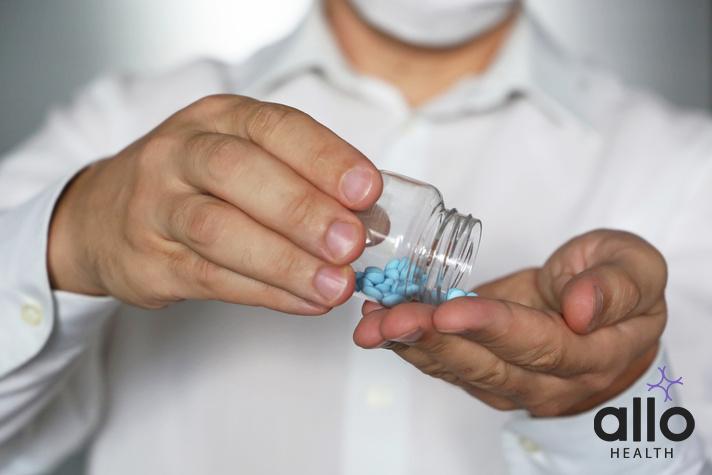How Much Does Erectile Dysfunction Surgery Cost?

Allo Health is dedicated to personalized well-being, offering support and trusted information tailored to individual health goals. The platform emphasizes human-generated content, led by a distinguished medical team of experts, including physicians and sexual health specialists. Their commitment to credibility involves rigorous fact-checking, authoritative research, and continuous updates to ensure accurate, up-to-date information. Allo Health's unique approach goes beyond conventional platforms, providing expert-led insights and a continuous commitment to excellence, with user feedback playing a crucial role in shaping the platform's authoritative voice.

Dr. Raj. R holds an undergraduate medical degree from the Philippines, and has a bachelors background in Psychology. His experience working in the field of urology further brought his interest forward in working towards his passion of understanding the science of attraction, intimacy, sex and relationships. A key motto he practices by remains unprejudiced and non-judgemental care.
Why This Was Upated?
Our experts continually monitor the health and wellness space, and we update our articles when new information became available.
Updated on 03 June, 2024
- Article was updated as part of our commitment to diversity, equity, and inclusion.

"The following blog article may discuss medical treatments and interventions. However, it is important to note that the information provided is for general educational purposes only and should not be considered as a substitute for professional medical advice, diagnosis, or treatment. Always seek the guidance of a qualified healthcare professional for personalized medical advice.
Book consultation
Medical treatments are complex and should be tailored to individual circumstances. The information presented in this blog may not be applicable to everyone, as each person's medical condition, history, and needs are unique. Only a qualified healthcare professional can evaluate your specific medical situation, consider relevant factors, and provide appropriate recommendations for diagnosis, treatment options, and monitoring.
It is crucial to note that self-diagnosis, self-medication, or relying solely on the information provided in this blog for treatment decisions can have serious health consequences. "
Erectile dysfunction (ED) is a prevalent health condition impacting sexual intercourse and quality of life for many. Surgical intervention, particularly through erectile dysfunction surgery, has become a viable treatment option. This article delves into how much does erectile dysfunction surgery cost, including types of implant surgeries, and other essential considerations.
What is Erectile Dysfunction?
Erectile dysfunction (ED) is a medical condition in which a man has difficulty achieving or maintaining an erection sufficient for sexual intercourse or other sexual activity. It’s a common issue, particularly in older men, but can affect males of all ages. The causes of erectile dysfunction are varied and can be either physical, psychological, or a combination of both.
Symptoms of Erectile Dysfunction
- Difficulty getting an erection
- Trouble maintaining an erection during sexual activities
- Reduced sexual desire
It’s important to note that occasional difficulty with erections is not necessarily a cause for concern. However, if erectile dysfunction is an ongoing concern, it can cause stress, affect self-confidence, and contribute to relationship concerns. It might also be a sign of an underlying health condition that needs treatment. Therefore, it’s advisable for individuals experiencing symptoms of ED to consult a healthcare professional for diagnosis and appropriate treatment.
Factors Affecting The Cost of Erectile Dysfunction Surgery
The cost of erectile dysfunction surgery is influenced by several factors, each contributing to the overall financial investment required for this treatment. Understanding these factors is crucial for patients with erectile dysfunction considering surgery as a treatment option. Here are the key factors affecting the cost:
- Type of Surgical Procedure: The choice between different types of implant surgeries, such as the 3-piece inflatable penile implant and the malleable penile implant, significantly influences cost. Inflatable implants, known for simulating a more natural erection, are typically more expensive than malleable implants.
- Hospital and Medical Facilities: The cost can vary based on the hospital or medical facility chosen for the surgery. Factors like location, reputation, and whether it’s a private or public hospital impact the cost. Indian hospitals, for instance, are often considered for their more affordable erectile dysfunction surgery options.
- Surgeon’s Expertise: Highly-qualified surgeons with specialized experience in erectile dysfunction treatment may charge more for their services. The expertise of the surgeon plays a crucial role in the success of surgical procedures and hence can affect the cost.
- Associated Health Conditions: The presence of other medical conditions, such as cardiovascular diseases or diabetes, can influence the surgery’s complexity and cost.
- Type of Medical Devices Used: The cost of the medical devices, such as the specific type of penile implant used, contributes to the total expense. Advanced technology implants with better functionality and longevity can be more expensive.
- Insurance Coverage and Financial Assistance Programs: The extent of insurance coverage for erectile dysfunction treatments can significantly affect the out-of-pocket cost for the patient. Some patients may also be eligible for financial assistance programs, which can help reduce the financial burden.
- Post-Surgery Considerations: Costs related to the recovery phase, including pain medication, follow-up consultations, and any necessary adjustments to the implants, can add to the overall cost of the procedure.
- Geographical Location: The cost of living and medical costs in different geographical regions can impact the cost of erectile dysfunction surgery. Prices may vary considerably from country to country and even within different regions of the same country.
By considering these factors, patients can make more informed decisions about erectile dysfunction surgery, weighing the cost benefits and ensuring they choose the best surgical option and treatment plan for their specific needs and financial situation.
Different Types and Cost of Erectile Dysfunction Surgery
Erectile Dysfunction (ED) surgery primarily involves the implantation of prosthetic devices within the penis. In India, the cost of such surgeries can vary depending on factors like the type of implant, hospital, location, surgeon’s expertise, and associated healthcare services.
1. Penile Implant Surgeries
These are the most common surgical procedures for treating ED when other treatments have failed.
Types of Penile Implants:
- Malleable (Semi-rigid) Penile Implant:
- This implant consists of a pair of bendable rods surgically inserted into the erection chambers of the penis.
- Cost: In India, the cost for a malleable penile implant surgery ranges approximately from INR 2 lakhs to 3 lakhs (USD 2,600 to 3,900).
- Inflatable Penile Implant:
- This more advanced option involves inserting cylinders that can be inflated and deflated using a pump placed in the scrotum.
- Types:
- 2-Piece Inflatable Implant: Offers simplicity but less firmness.
- 3-Piece Inflatable Implant: Provides a more natural erection and flaccidity.
- Cost: The cost for inflatable penile implant surgeries in India can range from INR 5 lakhs to 10 lakhs (USD 6,500 to 13,000), depending on the type of implant and other factors.
2. Vascular Surgery
- In rare cases, vascular reconstructive surgeries are performed to improve blood flow to the penis. These surgeries are usually for men with specific blood vessel problems.
- Cost: The cost of vascular surgeries for ED can vary widely, often being more expensive due to their complexity and the specific condition being treated.
Additional Costs to Consider
- Pre- and Post-Operative Care: Consultations, tests, hospital stay, and follow-up.
- Geographical Variations: Costs can vary between cities and hospitals in India.
- Surgeon’s Expertise: More experienced surgeons might charge higher fees.
Comparison of Erectile Dysfunction Surgery to Other Treatment Options

Understanding the cost comparison between erectile dysfunction surgeries and other treatment alternatives is crucial for patients making informed decisions. Let’s explore these costs and how they relate to factors such as treatment efficacy, long-term benefits, and overall health impact.
1. Surgical Procedures
- Cost of Penile Implants: The cost varies significantly, influenced by implant type (inflatable or malleable), surgeon expertise, and medical facility location. The average cost can range from moderately expensive to very high.
- Long-Term Solution: Despite the high upfront cost, surgeries offer a permanent solution, potentially reducing long-term expenses related to ongoing treatments.
2. Oral Medication
- Cost of Oral Medication: ED medications like sildenafil (viagra) or tadalafil (cialis) are usually taken on a need basis. The cost can add up over time, especially for patients requiring frequent use.
- Insurance Coverage: Many insurance plans cover oral medication, but this can vary.
3. Lifestyle Changes and Natural Remedies
- Cost-effective: Adopting healthier lifestyles or natural remedies often incurs minimal costs.
- Effectiveness: While beneficial for overall health and potentially improving ED symptoms, they may not be as immediately effective as medical or surgical treatments.
4. Alternative Medical Treatments
- Cost of Treatments like Injections: These are typically less expensive than surgery but more costly than oral medication.
- Effectiveness: They can be effective but require ongoing treatment, impacting long-term costs.
5. Insurance Coverage and Financial Assistance
- Surgical Coverage: Some insurance plans cover erectile dysfunction surgery, but this varies widely.
- Coverage for Oral Medication and Alternative Treatments: Generally, more widely accepted and covered by insurance plans.
6. Long-Term Financial Considerations
- Cost Benefits: Surgery, while expensive initially, may offer cost benefits in the long run by eliminating the need for continuous treatment.
- Financial Assistance Programs: Available for certain medical devices and surgical procedures, aiding in affordability.
Financial Options for Erectile Dysfunction Surgery

Financial options for erectile dysfunction surgery, such as implant surgeries and other surgical procedures, can vary, but generally include the following:
- Insurance Coverage: Many health insurance plans may provide coverage for erectile dysfunction treatment, including surgeries. It’s important to check with your insurer for specifics about benefit coverage for conditions like erectile dysfunction.
- Hospital Payment Plans: Some medical facilities, including Indian hospitals known for more affordable healthcare options, offer payment plans that allow patients to pay for the surgery over time.
- Financial Assistance Programs: Certain medical facilities or manufacturers of medical devices used in surgeries like the 3-piece inflatable penile implant or malleable implant might offer financial assistance programs to help patients with the cost.
- Personal Loans: Some patients opt for personal loans or medical loans, which can be used to finance the cost of surgery.
- Health Savings Accounts (HSAs) or Flexible Spending Accounts (FSAs): For those who have them, HSAs or FSAs can be used to pay for medically necessary surgeries, potentially offering tax benefits.
- Comparing Costs Between Hospitals: Patients are advised to research and compare costs among various medical facilities and highly-qualified surgeons to find the most cost-effective solution.
It’s essential for patients to thoroughly explore these options and discuss with their erectile dysfunction doctor or a financial advisor to make informed decisions based on their personal and financial circumstances.
Conclusion
Erectile dysfunction surgery can be an effective treatment for erectile dysfunction, offering a permanent solution for many. The cost of penile implants varies, but understanding the full range of treatment options, from natural remedies to advanced surgical procedures, allows patients to make an informed decision about their sexual health and quality of life.
Most Asked Questions
-
What are the main types of erectile dysfunction surgery, and how do they differ?
There are two primary types of surgeries: inflatable penile implants and malleable penile implants. Inflatable implants are more like a natural erection and feel more natural, but they are generally more expensive. Malleable implants are simpler and less costly but might not feel as natural. Your doctor can help you choose the best option based on your health conditions and personal preferences.
-
How much does erectile dysfunction surgery typically cost?
The cost of erectile dysfunction surgery varies greatly. It depends on factors like the type of implant you choose, the hospital you go to, and your surgeon’s expertise. It’s a good idea to ask for cost estimates from your doctor and check if your insurance covers this surgery. Some hospitals and health programs offer financial assistance, so don’t hesitate to inquire about these options.
-
Is erectile dysfunction surgery covered by insurance?
Insurance coverage for erectile dysfunction surgery depends on your insurance plan and the reasons for the surgery. It’s important to talk to your insurance provider to understand what’s covered. If insurance doesn’t cover it, you might want to explore financial assistance programs that some hospitals offer.
-
What should I expect during recovery from erectile dysfunction surgery?
Recovery times can vary, but it generally takes about 5-6 weeks. During this time, you may need pain medication and follow-up appointments with your doctor. It’s crucial to follow your doctor’s advice on activities and any lifestyle changes. Most patients see a significant improvement in their sexual function after full recovery, but it’s always good to have realistic expectations and discuss them with your doctor.






































